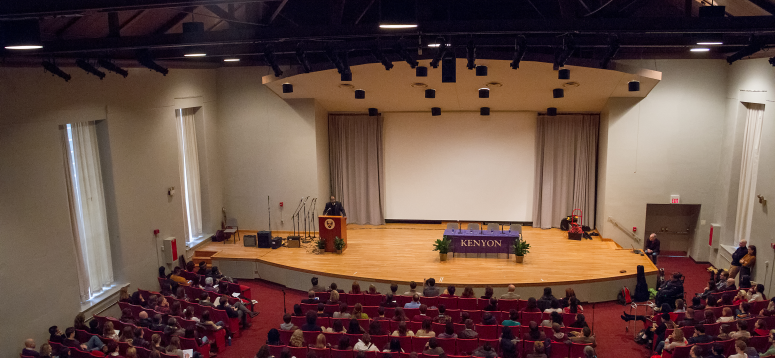Bending Toward Justice

From Kenyon News - January 13, 2017
One evening early in February 1968, a group of nearly 40 students walked into the All-Star Triangle Bowl in Orangeburg, South Carolina, ready to play a few frames. Before the students could step onto a lane, they ran into a problem: They were black, and the owner of the bowling alley refused to allow persons of color to bowl.
As the students returned to the alley the next two nights to protest, their numbers swelled, and tensions escalated. On the protest’s third night, students lit a bonfire near South Carolina State College, and firefighters and law enforcement arrived to douse the flames. An object allegedly tossed from the crowd of students struck a police officer, and officers began firing into the crowd. Two college students and a high school student were fatally shot, and at least 27 others were wounded.
The only person arrested and convicted from the night of the Orangeburg Massacre was Cleveland L. Sellers, a leader in the Student Nonviolent Coordinating Committee. Sellers was convicted on charges of inciting a riot and served nearly a year in prison. The police officers involved in the shootings were acquitted.
Sellers reflected on the tumultuous protest and the civil rights movement in his keynote address, “Only Hope Remains,” during Kenyon’s Martin Luther King Jr. Days of Dialogue program Monday, Jan. 16, at 3 p.m. in Rosse Hall.
“We all knew that by committing ourselves to the civil rights movement, we would have to make sacrifices,” Sellers, who was shot during the Orangeburg protest, said of his fellow activists.
In the decades since the Orangeburg Massacre, Sellers, who was pardoned in 1993, continued to be a civil rights activist and became a leader in higher education, serving for eight years as president of Voorhees College before retiring in spring 2016.
“To have Dr. Sellers here is wonderful,” said Associate Provost Ivonne García, co-chair of the event planning committee. “It lends a kind of gravitas when we have someone who was on the ground during the civil rights movement who can speak to that time and the arc of that legacy.”
Chris Kennerly, associate dean of students and director of the Office for Diversity, Equity and Inclusion, encouraged the planning committee to invite Sellers to speak. “I thought it would be a good idea to have someone speak who was involved in the civil rights movement and who also had a relationship with Dr. King. It is important to hear from and honor these individuals whenever we have the opportunity,” said Kennerly, who grew up in Orangeburg and had a relative injured in the shootings.
In his speech, Sellers compared the Black Lives Matter movement to the early days of SNCC and urged people to get involved in efforts for equality.
“We have not achieved a post-racial society,” Sellers said. “None of us can afford to take a backseat.”
Following Sellers’ speech, a question-and-answer session was held with a panel including Janet McAdams, the Robert P. Hubbard Professor in Poetry; Jacqueline McAllister, assistant professor of political science; Peter Rutkoff, professor of American studies; and Emma Schurink ’17 from Brooklyn, New York. The Chamber Singers and the Handsome Devils, a folk-blues band composed of faculty, staff and students, also performed.
The annual Martin Luther King Jr. Day of Dialogue is one of only three days in Kenyon’s academic calendar when class schedules are altered to encourage students, faculty and staff to attend an event. Some offices and buildings on campus, including the Kenyon Athletic Center and Olin and Chalmers libraries, closed during the event to allow the greatest number of students and staff to participate.
“The faculty felt that it is important to spend the day considering the history of the civil rights movement and dialoguing about how that impacts Kenyon and Kenyon’s own community,” García said.
A day of service is planned by the Office for Community Partnerships for Saturday, Jan. 21, to honor King’s legacy of creating change in order to help others. Students will volunteer at the Habitat for Humanity ReStore in nearby Mount Vernon.
Here is the full schedule of events:
Monday, Jan. 16
- 9-11 a.m. Annual celebration breakfast, featuring a panel of community leaders, in Peirce’s Thomas Hall. (To RSVP, call Lorie Shults at 740-427-5846.)
- 3-5 p.m. MLK Day of Dialogue, featuring Cleveland L. Sellers and a faculty-student panel discussion, in Rosse Hall.
- 5:10-7 p.m. Dinner in the Leach Private Dining Room.
Tuesday, Jan. 17
11:10 a.m. “Guess Who’s Coming to Shaker?” A discussion with Associate Provost for Diversity, Equity and Inclusion Ted Mason P’10, professor of English, about his family’s experience as one of the first black families in Shaker Heights, Ohio. This event, located in Peirce Lounge, is part of the National Day of Racial Healing, an event organized by the Association of American Colleges and Universities and the W. K. Kellogg Foundation.